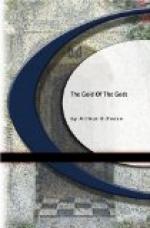“You are lucky not to have scratched yourself with it by accident while you were studying it.”
“Possibly I might have done it, if I had had it in my possession longer. It was only lately that I had leisure to study it.”
“You knew that it might offer some clue to the hidden treasure of Truxillo?” suggested Kennedy. “Have you any recollection of what the inscriptions on it said?”
“Yes,” returned Norton, “I had heard the rumours about it. But Peru is a land of tales of buried treasure. No, I can’t say that I paid much more attention to it than you might have done if some one asserted that he had another story of the treasure of Captain Kidd. I must confess that only when the thing was stolen did I begin to wonder whether, after all, there might not be something in it. Now it is too late to find out. From the moment when I found that it was missing from my collection I have heard no more about it than you have found out. It is all like a dream to me. I cannot believe even yet that a mere bit of archaeological and ethnological specimen could have played so important a part in the practical events of real life.”
“It does seem impossible,” agreed Kennedy. “But it is even more remarkable than that. It has disappeared without leaving a trace, after having played its part.”
“If it had been a mere robbery,” considered Norton, “one might look for its reappearance, I suppose, in the curio shops. For to-day thieves have a keen appreciation of the value of such objects. But, now that you have unearthed its use against Mendoza—and in such a terrible way—it is not likely that that will be what will happen to it. No, we must look elsewhere.”
“I thought I would tell you,” concluded Kennedy, rising to go. “Perhaps after you have considered it over night some idea may occur to you.”
“Perhaps,” said Norton doubtfully. “But I haven’t your brilliant faculty of scientific analysis, Kennedy. No, I shall have to lean on you, in that, not you on me.”
We left Norton, apparently now more at sea than ever. At the laboratory Kennedy plunged into some microphotographic work that the case had suggested to him, while I dashed off, under his supervision, an account of the discovery of curare, and telephoned it down to the Star in time to catch the first morning edition, in the hope that it might have some effect in apprising the criminal that we were hard on his trail, which he had considered covered.
I scanned the other papers eagerly in the morning for Kennedy, hoping to glean at least some hints that others who were working on the case might have gathered. But there was nothing, and, after a hasty bite of breakfast, we hurried back to take up the thread of the investigation where we had laid it down.
To our surprise, on the steps of the Chemistry Building, as we approached, we saw Inez Mendoza already waiting for us in a high state of agitation. Her face was pale, and her voice trembled as she greeted us.




